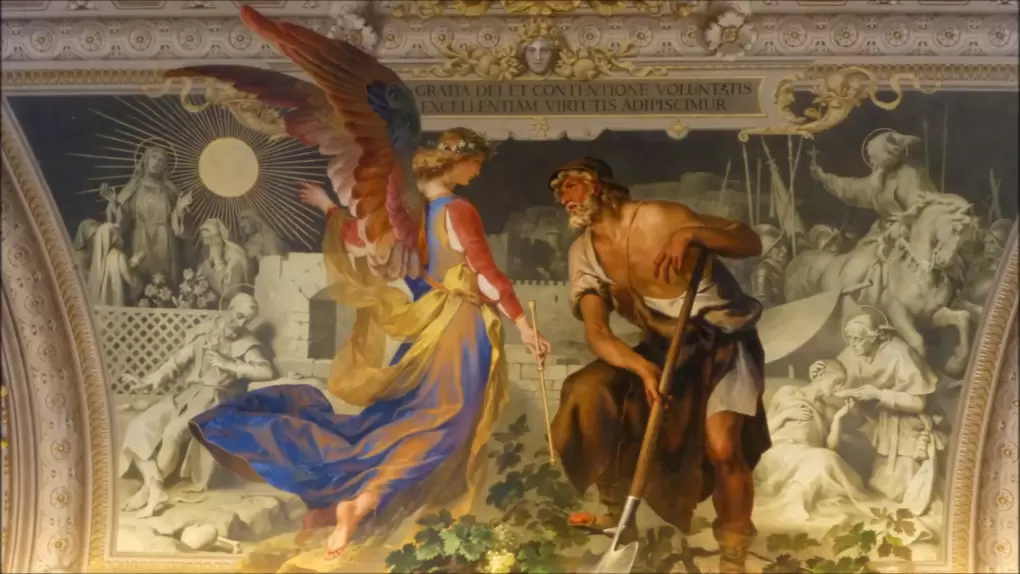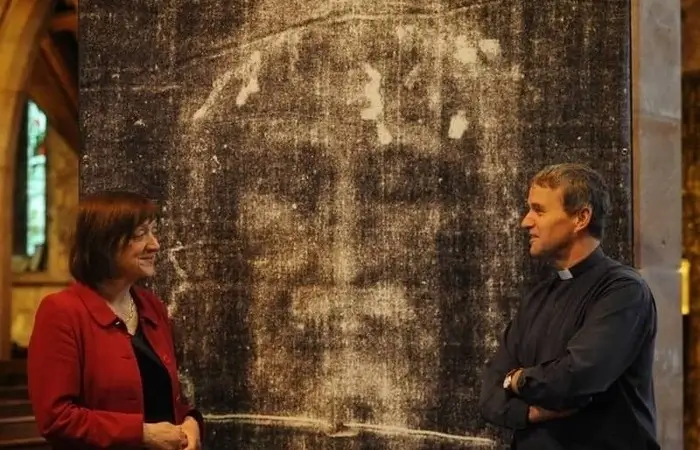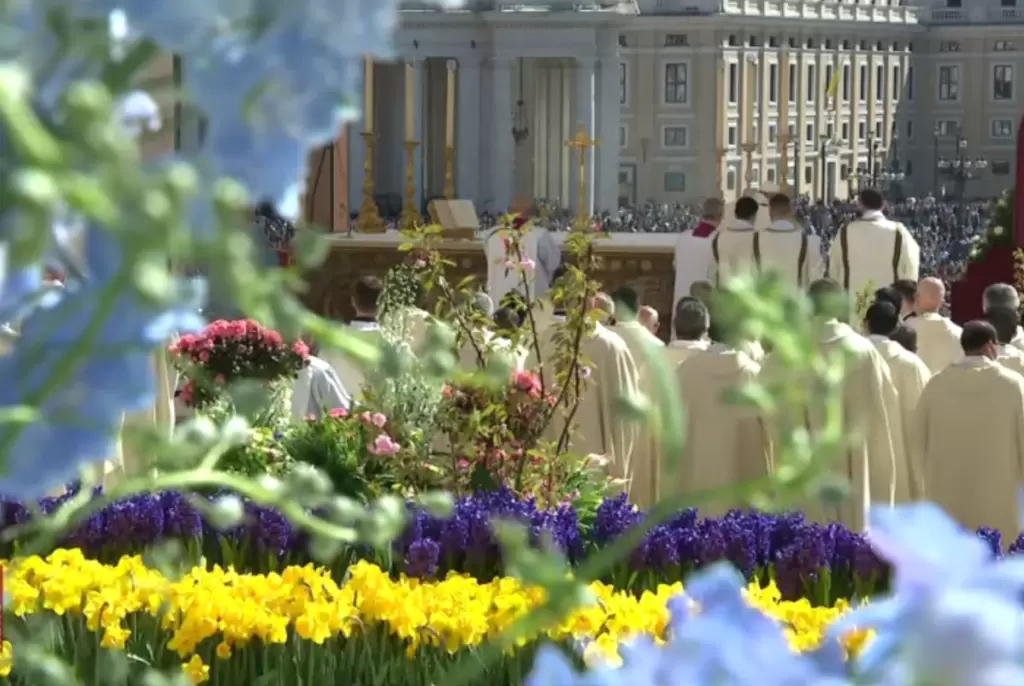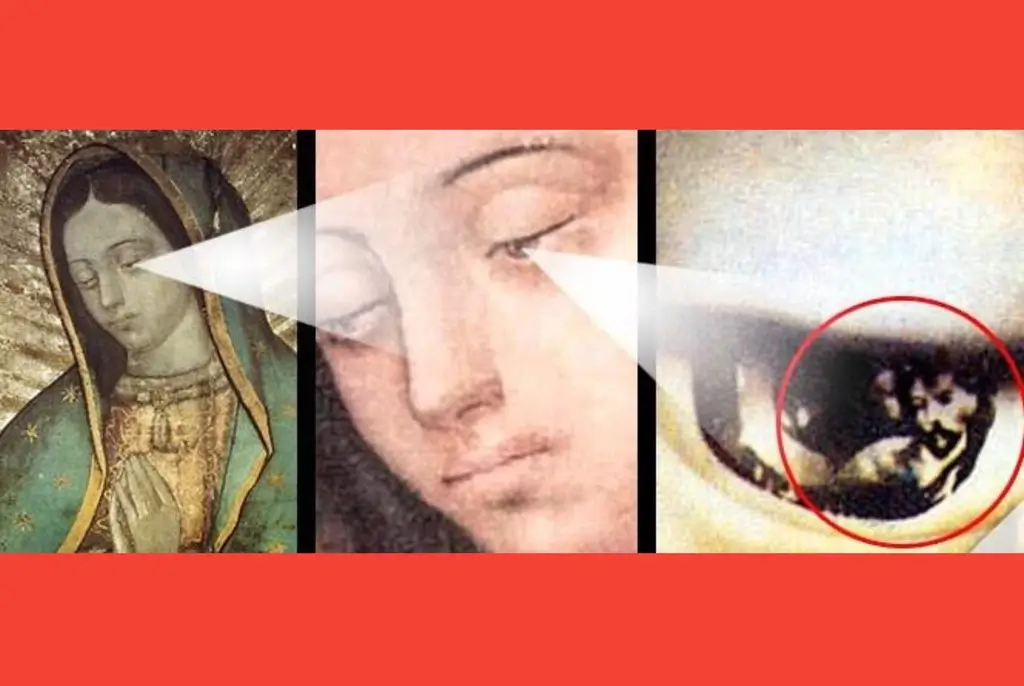Angels
The angels are represented throughout the Bible as a body of spiritual beings intermediate between God and men: “You have made him (man) a little less than the angels” (Psalm 8:6). They, equally with man, are created beings; “praise ye Him, all His angels: praise ye Him, all His hosts . . . for He spoke and they were made. He commanded and they were created” (Psalm 148:2-5; Colossians 1:16-17).
“Are they not all ministering spirits, sent to minister to them who shall receive the inheritance of salvation?” (Hebrews 1:14).

The function of the angelic host is expressed by the word “assistance” (Job 1:6; 2:1), and our Lord refers to it as their perpetual occupation (Matthew 18:10). More than once we are told of seven angels whose special function it is thus to “stand before God’s throne” (Tobit 12:15; Revelation 8:2-5). The same thought may be intended by “the angel of His presence” (Isaiah 63:9)
God’s messengers to mankind
The angels of the Bible generally appear in the role of God’s messengers to mankind. They are His instruments by whom He communicates His will to men, and in Jacob’s vision they are depicted as ascending and descending the ladder which stretches from earth to heaven while the Eternal Father gazes upon the wanderer below. It was an angel who found Agar in the wilderness (Genesis 16); angels drew Lot out of Sodom; an angel announces to Gideon that he is to save his people; an angel foretells the birth of Samson (Judges 13), and the angel Gabriel instructs Daniel (Daniel 8:16), though he is not called an angel in either of these passages, but “the man Gabriel” (9:21). The same heavenly spirit announced the birth of St. John the Baptist and the Incarnation of the Redeemer, while tradition ascribes to him both the message to the shepherds (Luke 2:9), and the most glorious mission of all, that of strengthening the King of Angels in His Agony (Luke 22:43). The spiritual nature of the angels is manifested very clearly in the account which Zacharias gives of the revelations bestowed upon him by the ministry of an angel. The prophet depicts the angel as speaking “in him”. He seems to imply that he was conscious of an interior voice which was not that of God but of His messenger.
Such appearances of angels generally last only so long as the delivery of their message requires, but frequently their mission is prolonged, and they are represented as the constituted guardians of the nations at some particular crisis, e.g. during the Exodus (Exodus 14:19; Baruch 6:6). Similarly it is the common view of the Fathers that by “the prince of the Kingdom of the Persians” (Daniel 10:13-21) we are to understand the angel to whom was entrusted the spiritual care of that kingdom, and we may perhaps see in the “man of Macedonia” who appeared to St. Paul at Troas, the guardian angel of that country (Acts 16:9). The Septuagint (Deuteronomy 32:8), has preserved for us a fragment of information on this head, though it is difficult to gauge its exact meaning: “When the Most High divided the nations, when He scattered the children of Adam, He established the bounds of the nations according to the number of the angels of God”. How large a part the ministry of angels played, not merely in Hebrew theology, but in the religious ideas of other nations as well, appears from the expression “like to an angel of God”. It is three times used of David (2 Samuel 14:17-20; 14:27) and once by Achis of Geth (1 Samuel 29:9). It is even applied by Esther to Assuerus (Esther 15:16), and St. Stephen’s face is said to have looked “like the face of an angel” as he stood before the Sanhedrin (Acts 6:15).
Personal guardians
Throughout the Bible we find it repeatedly implied that each individual soul has its tutelary angel. Thus Abraham, when sending his steward to seek a wife for Isaac, says: “He will send His angel before thee” (Genesis 24:7). The words of the ninetieth Psalm which the devil quoted to our Lord (Matthew 4:6) are well known, and Judith accounts for her heroic deed by saying: “As the Lord liveth, His angel hath been my keeper” (13:20). These passages and many like them (Genesis 16:6-32; Hosea 12:4; 1 Kings 19:5; Acts 12:7; Psalm 33:8), though they will not of themselves demonstrate the doctrine that every individual has his appointed guardian angel, receive their complement in our Saviour’s words: “See that you despise not one of these little ones; for I say to you that their angels in Heaven always see the face of My Father Who is in Heaven” (Matthew 18:10), words which illustrate the remark of St. Augustine: “What lies hidden in the Old Testament, is made manifest in the New”. Indeed, the book of Tobias seems intended to teach this truth more than any other, and St. Jerome in his commentary on the above words of our Lord says: “The dignity of a soul is so great, that each has a guardian angel from its birth.” The general doctrine that the angels are our appointed guardians is considered to be a point of faith, but that each individual member of the human race has his own individual guardian angel is not of faith (de fide); the view has, however, such strong support from the Doctors of the Church that it would be rash to deny it.
The Bible represents the angels not only as our guardians, but also as actually interceding for us. “The angel Raphael (Tobit 12:12) says: “I offered thy prayer to the Lord” (cf. Job 5:1 (Septuagint), and 33:23 (Vulgate); Apocalypse 8:4). The Catholic cult of the angels is thus thoroughly scriptural. Perhaps the earliest explicit declaration of it is to be found in St. Ambrose’s words: “We should pray to the angels who are given to us as guardians”
As divine agents governing the world
he foregoing passages, especially those relating to the angels who have charge of various districts, enable us to understand the practically unanimous view of the Fathers that it is the angels who put into execution God’s law regarding the physical world. The Semitic belief in genii and in spirits which cause good or evil is well known, and traces of it are to be found in the Bible. Thus the pestilence which devastated Israel for David’s sin in numbering the people is attributed to an angel whom David is said to have actually seen (2 Samuel 24:15-17).
The Semites clearly felt that all the orderly harmony of the universe, as well as interruptions of that harmony, were due to God as their originator, but were carried out by His ministers. This view is strongly marked in the “Book of Jubilees” where the heavenly host of good and evil angels is ever interfering in the material universe. Maimonides (Directorium Perplexorum, iv and vi) is quoted by St. Thomas Aquinas (Summa Theologicæ I.1.3) as holding that the Bible frequently terms the powers of nature angels, since they manifest the omnipotence of God.
Hierarchical organization
After Adam’s fall Paradise is guarded against our First Parents by cherubim who are clearly God’s ministers, though nothing is said of their nature. Only once again do the cherubim figure in the Bible, viz., in Ezechiel’s marvellous vision, where they are described at great length (Ezekiel 1), and are actually called cherub in Ezechiel 10. The Ark was guarded by two cherubim, but we are left to conjecture what they were like. It has been suggested with great probability that we have their counterpart in the winged bulls and lions guarding the Assyrian palaces, and also in the strange winged men with hawks’ heads who are depicted on the walls of some of their buildings. The seraphim appear only in the vision of Isaias 6:6.
Mention has already been made of the mystic seven who stand before God, and we seem to have in them an indication of an inner cordon that surrounds the throne. The term archangel occurs only in St. Jude and 1 Thessalonians 4:15; but St. Paul has furnished us with two other lists of names of the heavenly cohorts. He tells us (Ephesians 1:21) that Christ is raised up “above all principality, and power, and virtue, and dominion”; and, writing to the Colossians (1:16), he says: “In Him were all things created in heaven and on earth, visible and invisible, whether thrones or dominations, or principalities or powers.” It is to be noted that he uses two of these names of the powers of darkness when (2:15) he talks of Christ as “despoiling the principalities and powers . . . triumphing over them in Himself”. And it is not a little remarkable that only two verses later he warns his readers not to be seduced into any “religion of angels”. He seems to put his seal upon a certain lawful angelology, and at the same time to warn them against indulging superstition on the subject.
The treatise “De Coelesti Hierarchia”, which is ascribed to St. Denis the Areopagite, and which exercised so strong an influence upon the Scholastics, treats at great length of the hierarchies and orders of the angels. It is generally conceded that this work was not due to St. Denis, but must date some centuries later. Though the doctrine it contains regarding the choirs of angels has been received in the Church with extraordinary unanimity, no proposition touching the angelic hierarchies is binding on our faith. The following passages from St. Gregory the Great (Hom. 34, In Evang.) will give us a clear idea of the view of the Church’s doctors on the point:
We know on the authority of Scripture that there are nine orders of angels, viz., Angels, Archangels, Virtues, Powers, Principalities, Dominations, Throne, Cherubim and Seraphim. That there are Angels and Archangels nearly every page of the Bible tell us, and the books of the Prophets talk of Cherubim and Seraphim. St. Paul, too, writing to the Ephesians enumerates four orders when he says: ‘above all Principality, and Power, and Virtue, and Domination’; and again, writing to the Colossians he says: ‘whether Thrones, or Dominations, or Principalities, or Powers’. If we now join these two lists together we have five Orders, and adding Angels and Archangels, Cherubim and Seraphim, we find nine Orders of Angels.
St. Thomas (Summa Theologica I:108), following St. Denis (De Coelesti Hierarchia, vi, vii), divides the angels into three hierarchies each of which contains three orders. Their proximity to the Supreme Being serves as the basis of this division. In the first hierarchy he places the Seraphim, Cherubim, and Thrones; in the second, the Dominations, Virtues, and Powers; in the third, the Principalities, Archangels, and Angels. The only Scriptural names furnished of individual angels are Raphael, Michael, and Gabriel, names which signify their respective attributes.
The evil angels
The distinction of good and bad angels constantly appears in the Bible, but it is instructive to note that there is no sign of any dualism or conflict between two equal principles, one good and the other evil. The conflict depicted is rather that waged on earth between the Kingdom of God and the Kingdom of the Evil One.
n New Testament times the idea of the two spiritual kingdoms is clearly established. The devil is a fallen angel who in his fall has drawn multitudes of the heavenly host in his train. Our Lord terms him “the Prince of this world” (John 14:30); he is the tempter of the human race and tries to involve them in his fall (Matthew 25:41; 2 Peter 2:4; Ephesians 6:12; 2 Corinthians 11:14; 12:7). Christian imagery of the devil as the dragon is mainly derived from the Apocalypse (9:11-15 and 12:7-9), where he is termed “the angel of the bottomless pit”, “the dragon”, “the old serpent”, etc., and is represented as having actually been in combat with Archangel Michael.
Angels in the New Testament
Our Lord in His discourses talks of them as one who actually saw them, and who, whilst “conversing amongst men”, was yet receiving the silent unseen adoration of the hosts of heaven. He describes their life in heaven (Matthew 22:30; Luke 20:36); He tell us how they form a bodyguard round Him and at a word from Him would avenge Him on His enemies (Matthew 26:53); it is the privilege of one of them to assist Him in His Agony and sweat of Blood. More than once He speaks of them as auxiliaries and witnesses at the final judgment (Matthew 16:27), which indeed they will prepare (13:39-49); and lastly, they are the joyous witnesses of His triumphant Resurrection (28:2).
It is easy for skeptical minds to see in these angelic hosts the mere play of Hebrew fancy and the rank growth of superstition, but do not the records of the angels who figure in the Bible supply a most natural and harmonious progression?
In the opening page of the sacred story the Jewish nation is chosen out from amongst others as the depositary of God’s promise; as the people from whose stock He would one day raise up a Redeemer. The angels appear in the course of this chosen people’s history, now as God’s messengers, now as that people’s guides; at one time they are the bestowers of God’s law, at another they actually prefigure the Redeemer Whose divine purpose they are helping to mature. They converse with His prophets, with David and Elias, with Daniel and Zacharias; they slay the hosts camped against Israel, they serve as guides to God’s servants, and the last prophet, Malachi, bears a name of peculiar significance; “the Angel of Jehovah.” He seems to sum up in his very name the previous “ministry by the hands of angels”, as though God would thus recall the old-time glories of the Exodus and Sinai.
The Septuagint, indeed, seems not to know his name as that of an individual prophet and its rendering of the opening verse of his prophecy is peculiarly solemn: “The burden of the Word of the Lord of Israel by the hand of His angel; lay it up in your hearts.” All this loving ministry on the part of the angels is solely for the sake of the Saviour, on Whose face they desire to look.
Hence when the fullness of time was arrived it is they who bring the glad message, and sing “Gloria in excelsis Deo”. They guide the newborn King of Angels in His hurried flight into Egypt, and minister to Him in the desert. His second coming and the dire events that must precede that, are revealed to His chosen servant in the island of Patmos, It is a question of revelation again, and consequently its ministers and messengers of old appear once more in the sacred story and the record of God’s revealing love ends fittingly almost as it had begun: “I, Jesus, have sent My angel to testify to you these things in the churches” (Revelation 22:16).
It is easy for the student to trace the influence of surrounding nations and of other religions in the Biblical account of the angels. Indeed it is needful and instructive to do so, but it would be wrong to shut our eyes to the higher line of development which we have shown and which brings out so strikingly the marvellous unity and harmony of the whole divine story of the Bible.
Quick Learning
Fulton Sheen: Angels
Fulton John Sheen (born Peter John Sheen, May 8, 1895 – December 9, 1979) was an American bishop (later archbishop) of the Roman Catholic Church known for his preaching and especially his work on television and radio. His cause for canonization as a saint was officially opened in 2002. In June 2012, Pope Benedict XVI officially recognized a decree from the Congregation for the Causes of Saints stating that he lived a life of “heroic virtues” – a major step towards beatification – so he is now referred to as “Venerable”.
Guardian Angels ~ Fr Ripperger
Chad Alec Ripperger is an American Catholic priest, theologian, and exorcist.
A lecture on Angels. What are they? How do they be? What do they do? How can we grow in our relationship to our guardian angel? How did we get our guardian angel? What can guardian angels do & not do?
wisdom was hidden in things from the foundation of the world
Become Part of Catholic Principle to Further Your Knowledge.















Leave A Comment